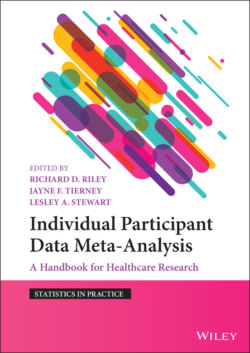Читать книгу Individual Participant Data Meta-Analysis - Группа авторов - Страница 19
2.2.2 The Process and Methods
ОглавлениеFigure 2.1 provides key differences in the process of conducting IPD meta‐analysis projects compared to conventional reviews based on aggregate data.7,43 Best practice is to publish and adhere to a protocol, regardless of whether aggregate data or IPD are being used, although protocols for IPD projects will usually be more detailed (Section 4.2.2). Methods for identifying trials are very similar in the two approaches, but in an IPD project searches may be conducted prior to or in tandem with protocol development, in order to generate a preliminary list of trials (Section 4.2.3), and to identify the associated investigators from whom IPD will be sought (Section 3.2).
Prior to data collection, an IPD project may require ethical approval (Section 3.10) and development of formal data‐sharing agreements (Section 3.11), as well as the preparation of a detailed data dictionary (Section 4.2.7). These are rarely required for an aggregate data review. Furthermore, the subsequent data collection, checking and analytical aspects of an IPD project are much more exacting than those for aggregate data reviews. They may include data entry, data re‐coding and harmonisation, together with checking, querying and subsequent validation of IPD with original trial investigators (Chapter 4),7,43,44 as well as advanced statistical methods for meta‐analysis (Part 2).
Unlike aggregate data reviews, IPD projects usually involve and benefit from establishing partnerships with trial investigators who, in addition to providing their IPD, play an active role throughout the process, from identifying relevant trials through to helping interpret and disseminate IPD meta‐analysis results. This may include establishing a collaborative group that authors the main project publication, with all those involved being listed as co‐authors, and holding a meeting of this Group where preliminary results are presented and discussed (Section 3.8).7,43 Recently, a range of clinical study data repositories and platforms have been established, offering another source of IPD from existing trials, but there are both advantages and disadvantages of obtaining for IPD meta‐analysis projects in this way (Sections 3.2.2 and 4.4.5).45
Figure 2.1 Key differences between the process for a IPD meta‐analysis project and a conventional systematic review and meta‐analysis of aggregate data.
Source: Jayne Tierney.
Given these differences, IPD meta‐analysis projects require a greater range of skills (Section 3.5), generally take longer (Section 3.7), and need more resources (Section 3.8) than traditional systematic reviews and meta‐analyses based on aggregate data.
